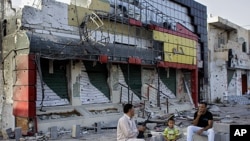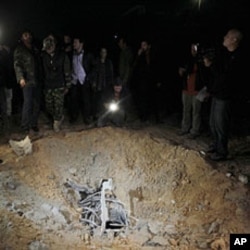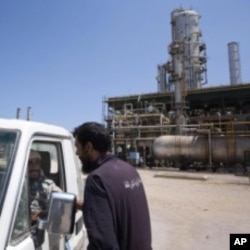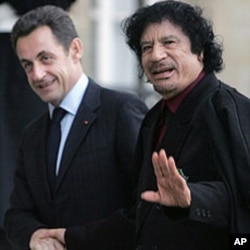As Congress prepares to address a federal deficit of historic proportions and decide how much to spend on foreign affairs in 2012, U.S. lawmakers will also look at the cost of re-building Iraq and Afghanistan after over the past decade and consider what to do in Libya.
The costs in those two wars were high: $1.28 trillion for both and subsequent national reconstruction over the past decade, according to the U.S. Congressional Research Service. Nation building was a portion of the overall price tag. But given the United States’ fiscal restraints looking forward, the Obama administration is unlikely to commit to buttressing a third nation any time soon.
Fortunately, France and the United Kingdom have expressed willingness to step into the breach to help the new Libya get on its feet since the U.S. is preoccupied with other engagements. As a leader of the NATO air campaign to support the rebels, the U.S. is still a major player.
“I think we have gotten involved,” said Brookings Institution analyst Michael O’Hanlon days before Libyan rebels succeeded in penetrating and taking over the capital city Tripoli., “So the question is, do we consider whether we put boots on the ground as far as a peacekeeping force or a stabilization force if and when there is a moment when that’s appropriate. That’s different from the way we got involved in Iraq or Afghanistan.”
Of course, the cost of Libya’s reconstruction is not yet known. In February, the European Union initially offered six billion Euros to aid democratic reform movements in Libya, Tunisia, Egypt and others observing an Arab Spring. As the United States’ engagements in Iraq and Afghanistan demonstrate, estimated reconstruction costs have a tendency to balloon far beyond initial projections. O’Hanlon estimates the U.S. has spent $50 billion each for Iraq and Afghanistan in nation building alone.
“If we indeed we’re going to do another invasion operation in the Middle East,” said O’Hanlon, “even if we were part of a broad coalition, you just have to be braced for, say, even if it goes pretty well, a half trillion dollars in costs and probably a thousand or more dead Americans. And I don’t think anybody is in the mood for that.”
Learning from the United States costly experiments in trying to rehabilitate Iraq and Afghanistan, other governments apparently willing to try their hand of re-building a country they did not invade by proceeding cautiously.
As the conflict in Libya narrowed to Gadhafi’s tribal stronghold of Sirte and other communities, France was one of the European nations that stepped forward. The ties between the two countries have been strong if not always constructive: Under Gadhafi, France has hosted thousands of refugees; the two countries maintained robust trade relations; and France, which is the world’s eighth-biggest consumer or oil, depends on nearby Libya for some of those imports.
France finally responds to a Middle East revolution
“From Washington, the enthusiasm of the French for intervention in Libya is seen with a mixture of relief and puzzlement,” wrote Dominique Moisi, a founder and senior advisor to the French Institute for International Relations in Paris, when European powers began supporting rebels in eastern Libya.
“Americans do not want the job and are happy that someone else does,” Moisi wrote. He described the United States’ dilemma over calling for direct action against Moammar Gadhafi and President Barack Obama’s inclination to restraint. “President Nicolas Sarkozy’s willingness to intervene, with the aid of British Prime Minister David Cameron, helped close a dangerous gap” for the world’s leader in state-building.
France re-opened its embassy in Tripoli by the end of August. The government hosted a September 1 Friends of Libya conference on the question of reconstruction and the French foreign minister urged the European Union to send observers to Libya to assess the need for reconstruction. President Nicolas Sarkozy took the lead in marshalling global forces to help Libyans building the institutions that will sustain a new democratic country. So one could argue France’s interest in Libya’s rehabilitation has begun in earnest already.
Why did France volunteer?
France stepped forward for many reasons. Oil is certainly one of them, because Libya is a significant supplier of oil to Europe, France in particular. According to estimates published last week in the Guardian, Libya was producing approximately 1.6 billion barrels per day when the civil war halted production. Moisi assumes Libya’s revenues from those exports can repay the donors and developers helping with its reconstruction. “It is a rich self-sufficient country that needs help but that help will be repaid,” Moisi argues
Repairing France’s brand in the Middle East was another reason Sarkozy has led by example, said Moisi in an interview with VOA. “Of course, there were political reasons for France, one of them being the fact that France had been caught by surprise by the events in Tunisia and Egypt and initial reaction to the two events was quite negative.”
The French government, like many western powers including the United States, has supported authoritarian regimes in the past, Gadhafi in particular. Gadhafi and his entourage pitched their Bedouin tents on the grounds of the Elysee Palace in 2007.
When the uprisings began in Tunisia, France offered riot control assistance to President Zine el-Abadine Ben Ali. It wasn’t until the success of the movement in Tunisia and Egypt became assured that France decided it was on the wrong side of history in the Middle East. And also, perhaps, it was time for France to take a pro-humanitarian stance in the region.
“And France clearly wanted to compensate Libya for what she had failed to do in Tunisia and Egypt,” Moisi said. “But humanitarian reasons played a major role in our intervention in Benghazi and later on altogether in Libya. At the time Benghazi was about to fall to Libyan forces led by Colonel Gadhafi, we started on a humanitarian basis.”
Learning from America’s mistakes
As France, the United Kingdom and other European powers discuss a course of action with the United States, they will study what happened on Iraq and Afghanistan, said Moisi. “There are many scenarios, many alternatives. We are trying to learn from the negative lessons of Iraq.”
The first lesson learned in the last decade that has sunk in as a guidance for the future is this: to take on a nation on your own is costly and can prove unpopular. Go go multilateral. “You can’t go alone without an international resolution, without some kind of Arab support and Arab involvement,” Moisi said. “And once victory is achieved, you don’t disband immediately all the security apparatus of the country you have liberated.”
France’s approach may vary from the United States where leveraging existing political and economic assets may prove more fruitful than a wholesale dismantling of the past regime.















